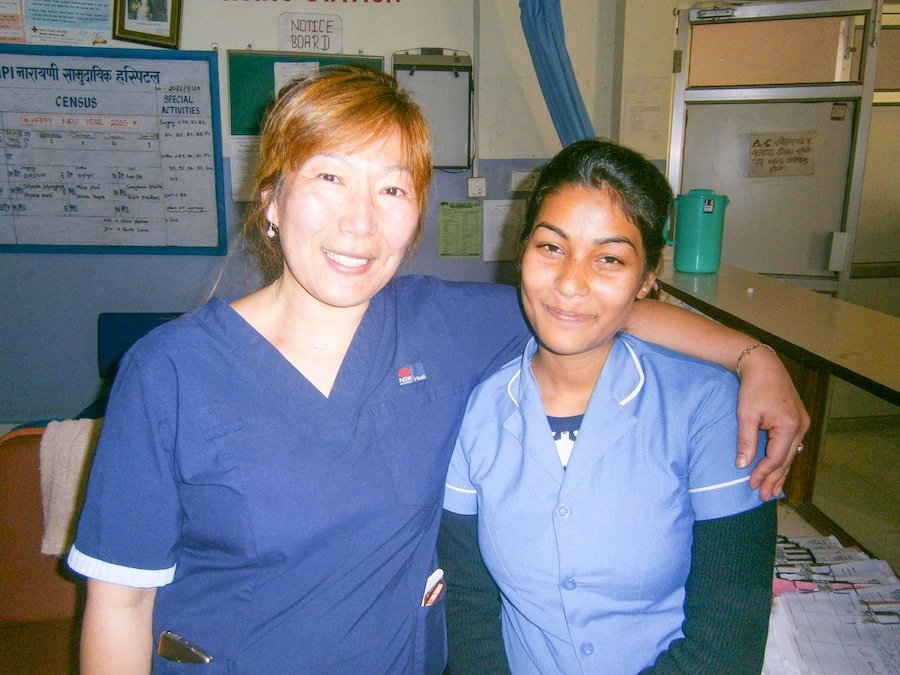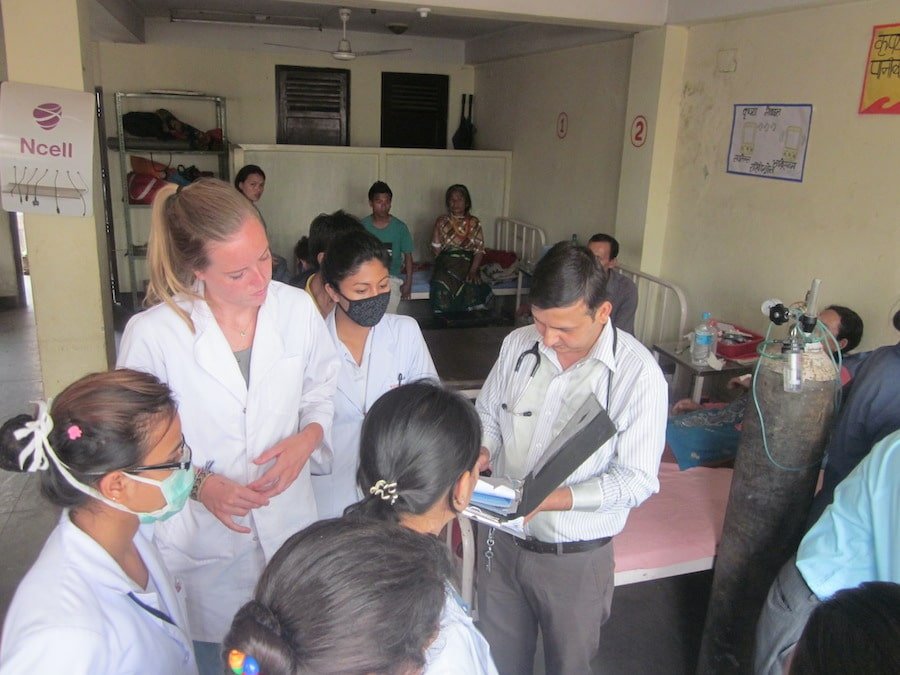Join the Immersion
Internships Abroad with Abroad Escape
By participating in our international medical healthcare internships abroad programs in 2024 and 2025, you’ll gain the knowledge, experience, and confidence you need to succeed in your career. As an intern abroad, you will have the opportunities to gain work experience, study abroad, and achieve real personal growth during your internship placement in your chosen career field for amazing professional experience, living and working abroad for your professional development, and improving your language skills, whilst developing your global network. Our medical internships are unique as they include and immersion program so you can integrate and have an amazing cultural experience as well.


What are the benefits of a medical internship abroad?
A medical internship abroad offers a unique blend of practical experience, personal growth, and cultural exposure that can significantly enhance the career trajectory of medical students and professionals.
By stepping outside the confines of their home country’s healthcare system, interns can gain invaluable insights into global health challenges, develop a broader skill set, and become more adaptable, culturally sensitive healthcare providers. Here’s a look at some of the key benefits of pursuing a medical internship abroad.
1. Exposure to Diverse Healthcare Systems
One of the most significant benefits of interning abroad is the opportunity to experience different healthcare systems. Medical interns can work in environments ranging from highly resource-limited rural clinics to cutting-edge urban hospitals.
Each setting offers its challenges and learning opportunities, broadening the intern’s understanding of how healthcare is delivered across the world.
For instance, an intern in a developing country may learn to adapt to situations with limited medical supplies or technology, encouraging innovation and problem-solving skills. On the other hand, an internship in a technologically advanced country may expose the intern to cutting-edge medical techniques and equipment that they might not encounter at home.
2. Clinical Experience
In many international placements, medical interns may have the opportunity to take on a more active clinical role than they might in their home countries. This can include tasks such as patient examinations, administering treatments, assisting in surgeries, and conducting laboratory tests, depending on the country’s regulations and the intern’s level of training. The practical exposure gained during these internships accelerates the learning curve by putting theoretical knowledge into practice.
Moreover, the experience of treating a wider variety of illnesses and injuries than what one might typically see at home allows interns to broaden their clinical expertise. In countries with endemic diseases that may be rare in their home country, interns can gain first-hand experience with conditions like malaria, dengue fever, or tuberculosis.
3. Cultural Competence and Sensitivity
Cultural competence is an increasingly essential skill in today’s globalized world. Medical internships abroad offer the chance to work with patients from diverse cultural backgrounds, learning how cultural factors can influence healthcare beliefs, behaviors, and outcomes. Interns will have to navigate language barriers, traditional medicine practices, and local customs, all of which can deeply affect patient care.
This experience fosters empathy, adaptability, and communication skills, helping interns become more culturally aware healthcare providers. When they return to their home countries, they are better equipped to treat patients from various ethnic and cultural backgrounds with greater sensitivity and understanding.
4. Strengthened Professional Networks
International medical internships often provide an opportunity to build a global professional network. Interns may work alongside local doctors, international healthcare volunteers, and medical students from various parts of the world. These connections can be beneficial for future collaborations, research opportunities, and job prospects.
Furthermore, working closely with experienced professionals abroad allows interns to receive mentorship and guidance from medical practitioners who bring diverse perspectives and approaches to care. This global professional network can enrich one’s career in the long term by opening doors to international opportunities and shared knowledge.
5. Personal Growth and Resilience
An internship abroad is as much a journey of personal growth as it is a professional one. Interns are often placed in unfamiliar environments, away from their usual support networks, which fosters self-reliance, resilience, and adaptability. Navigating a new country, language, and healthcare system forces interns to develop strong problem-solving skills and flexibility, traits that are invaluable in both personal and professional life.
Living and working in a different cultural setting also encourages greater self-awareness and reflection. Medical interns often return from these experiences with a heightened sense of confidence, a deeper appreciation for global health issues, and a greater commitment to making a positive impact in healthcare.
6. Language Skills Development
Working in a foreign country often means learning and practicing a new language, particularly medical terminology in that language. While this may initially seem like a daunting challenge, it can lead to significant professional and personal growth. Being able to communicate with patients and colleagues in their native language not only improves patient care but also boosts the intern’s linguistic skills—an asset in an increasingly globalized job market.
Moreover, learning medical terms in a different language can also deepen the understanding of medical concepts as interns have to think critically about how they explain complex conditions in simpler terms to overcome language barriers.
7. Contribution to Global Health
For those passionate about global health, a medical internship abroad provides the chance to contribute directly to underserved or marginalized communities. Whether it’s through providing care in a resource-scarce region or assisting in health education campaigns, medical interns can have a tangible impact on the communities they serve.
This experience often instills a deeper sense of social responsibility and can inspire interns to continue working in global health or public health sectors after their internship. An understanding of health disparities and the challenges faced by low-income populations can shape an intern’s career goals and drive them to pursue work that addresses these inequities.
8. Increased Employability
Finally, completing a medical internship abroad can significantly boost an intern’s resume. Employers value candidates who demonstrate adaptability, cultural sensitivity, and a willingness to step outside their comfort zone. Interning abroad showcases initiative and a commitment to gaining a comprehensive education, which can set candidates apart in a competitive job market.
Additionally, the practical skills gained in a diverse clinical setting, along with soft skills like communication, teamwork, and problem-solving, make interns more well-rounded and attractive to prospective employers.
A medical internship abroad is a life-changing experience that offers far-reaching benefits for both personal and professional development.
From gaining hands-on clinical experience and exposure to diverse healthcare systems to enhancing cultural competence and language skills, the experience can equip aspiring medical professionals with a well-rounded and global perspective on healthcare.
Beyond the technical skills, personal growth, increased employability, and expanded professional networks make a medical internship abroad an invaluable step in shaping a successful and impactful medical career.
FAQ
Q: What is an international internship?
A: An international internship is a work experience opportunity for students or young professionals to gain hands-on experience in their career field in a foreign country.
Q: What is the difference between an internship program and studying abroad?
A: An internship program focuses on providing students or young professionals with work experience in their desired career field while studying abroad emphasizes academic credit and learning in a foreign country.
Q: Who is eligible for an international internship?
A: College students or recent graduates who are looking for internships abroad are eligible for an international internship.
Q: Do I need to know a foreign language to complete an international internship?
A: It depends on the internship, but knowing a foreign language can be beneficial. However, many international companies offer internships in English-speaking environments.
Q: How can completing an international internship benefit my career?
A: Completing an international internship can offer valuable work experience, make your resume stand out, build a global network, and provide personal and professional growth.
Q: Are internships abroad useful?
A: Yes, internships abroad can provide unique insight into different cultures and work environments and offer valuable work experience.




